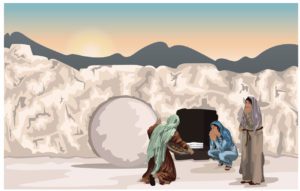filter posts:
Date
God had mercy on Noah…and Us
 God spoke to Noah, and it is the first recorded time that God spoke to man since Cain. God told him what he was about to do, as God would do with Abraham years later, before the destruction of Sodom and Gomorrah. And God commissioned Noah to build an ark, a vessel of rescue. The word for ark literally means “box,” or “chest.” The ark of the covenant was just that: a chest that held very important items of remembrance. But this ark was different because people would enter it, and it would float on water. The ark was not a ship; it had no rudder, no means of navigation or steering. It was simply a place to provide temporary shelter and order for a few people and a bunch of animals. There was one other ark mentioned in the Bible, remember? It was also a box intended for rescue. Moses was supposed to be killed, by Pharaoh’s order, but by God’s grace and his mother’s wisdom, he was placed in the “ark of bulrushes” as the King James Version called it, and this ark was put into the Nile River.
God spoke to Noah, and it is the first recorded time that God spoke to man since Cain. God told him what he was about to do, as God would do with Abraham years later, before the destruction of Sodom and Gomorrah. And God commissioned Noah to build an ark, a vessel of rescue. The word for ark literally means “box,” or “chest.” The ark of the covenant was just that: a chest that held very important items of remembrance. But this ark was different because people would enter it, and it would float on water. The ark was not a ship; it had no rudder, no means of navigation or steering. It was simply a place to provide temporary shelter and order for a few people and a bunch of animals. There was one other ark mentioned in the Bible, remember? It was also a box intended for rescue. Moses was supposed to be killed, by Pharaoh’s order, but by God’s grace and his mother’s wisdom, he was placed in the “ark of bulrushes” as the King James Version called it, and this ark was put into the Nile River.
God gave Noah the exact specifications for the ark, and it was huge. 450 feet long, 75 feet wide, and 45 feet tall. It was 238 feet longer than the Cutty Sark, the longest boat ever constructed out of wood, and that was in the late 1800’s in England. Noah’s ark also had three different levels, a roof, and a door on the side. Building the ark was a mammoth project which became Noah and his sons’ life work for the next 100 years. By the way, you can walk through a replica, with the exact dimensions mentioned here, and see how the travelers, people and animals, may have lived on the ark for an estimated 370 days. Look up “Ark Encounter” in Kentucky.
God commissioned Noah to build the ark and told him why: “I will bring a flood of waters upon the earth to destroy all flesh in which is the breath of life under heaven.” That refers to people, for only men and women have the breath of life. “Everything that is on the earth shall die.” That refers to everything else! Every bird, every animal, every creeping thing not brought into the ark would die. God commanded Noah to bring two of every living thing onto the ark, “male and female.” There it is again, God’s design for creation, for every living thing, is male and female. He was also commanded to store up food, every sort of food, for the days they will be on the ark. Listen, saints, as far as I know, this is the only time when God commanded his people to store up food for the end of the world as we know it. God told Joseph to store food for a famine, but worldwide destruction was not God’s plan then, as it was with Noah. Simply put, there is no biblical precedent for “preppers.” These are the only ones, Noah and his family.
How did Noah respond to this command to build an ark that would bear up the remnant when a flood came on the land, a land that had, as far as we know, never even seen rain? “Noah did this; he did all that God commanded him.” Noah believed God. Period. That’s what we read in Hebrews: “By faith, Noah, being warned by God concerning events as yet unseen, in reverent fear constructed an ark for the saving of his household.”
I was reminded of Keith Green’s song, “He’ll Take Care of the Rest,” and this verse:
You just think about Noah
Totin’ his umbrella when there wasn’t a cloud in the sky
All his neighbors would laugh at his pet giraffe
And they would oh-ho, snicker as he passed by
But the Lord said, “Hey Noah, be cool
Just keep building that boat
It’s just a matter of time till they see who’s gonna float
You just keep doing your best and pray that it’s blessed
Hey Noah, I’ll take care of the rest, I’m the weather man.”
God spared Noah and his family so that one day he could spare you and me.
April 24, 2022
Surprised by Jesus
 A professor at Asbury Seminary told the story of a Muslim who became a Christian. “Some of his friends asked him, ‘Why have you become a Christian? Why have you disrespected Mohammed to follow Jesus?’ He answered, ‘Well, suppose you were going down the road and you came to a fork. You didn’t know which way to go, and there at the fork in the road were two men, one dead and one alive–which one would you ask which way to go?’”
A professor at Asbury Seminary told the story of a Muslim who became a Christian. “Some of his friends asked him, ‘Why have you become a Christian? Why have you disrespected Mohammed to follow Jesus?’ He answered, ‘Well, suppose you were going down the road and you came to a fork. You didn’t know which way to go, and there at the fork in the road were two men, one dead and one alive–which one would you ask which way to go?’”
Mary Magdelene did not come to a fork in the road on that first Easter Sunday morning, but to the tomb where she knew Jesus had been placed on Friday. She came expecting to find the dead body of her Lord still there. But she found much more than she expected. He had already surprised her at least twice. He surprised her with deliverance when Jesus cast out seven demons from Mary. Then he surprised her with his sacrifice.
Mary had stood by the cross and watched him die. I know a little of what it’s like to stand by and watch someone die. My father died on Palm Sunday in 2006 after a 6-month battle with cancer. He fought to live more than anyone I have ever known, but what surprised me in all of the battle was how much my father loved my Mom. I knew they loved each other, but I witnessed a greater love between them as Dad was dying than I had ever seen. The only time I ever saw my father cry was when his three sons were standing at his bed on Sunday, December 25, 2005. He knew he was dying but he wept as he said, “I’ve got to fight this. I can’t leave your mother alone.” Even in the agony of cancer, with the hair loss and the horrifying weight-loss (my 6’3” Dad lost to below 120 lbs. before he died) and the nausea and the humiliation that comes with not being in control anymore, my dad demonstrated a love for my Mom that was amazing. Six weeks before he died, when Dad was still able to walk and even climb the steps and sleep in their bed, Mom tucked him in and gave him a kiss on the cheek. She got in bed and turned over to sleep when she felt the bed move and saw my dad get up and come around the bed. “Honey, what are you doing?” Mom asked. Dad said, “I’m coming to tuck you in.”
Mary stood and watched Jesus die, not really understanding yet that his death was necessary for Mary to be delivered again. This time not from her bondage to demons, but from death. This was Friday. She would come to understand it on Sunday. Jesus surprised Mary with her deliverance and with his sacrifice. Then Jesus surprised her with his resurrection.
Jesus was the LAST person Mary expected to see at the tomb. Oh, she expected to see him, all right, but just his dead body. And then, she couldn’t believe it: his dead body was not there! Broken heart broke more as she grieved and wondered who had taken his body away. In her grief she saw someone she thought was the gardener. He spoke to her, asked her why she was weeping and whom she was seeking, and she still didn’t recognize him. But then he spoke her name, and she could see him clearly now. He called Mary by name, and the fear and the grief and the sorrow and the pain all melted away in an instant. Believers, this is our greatest surprise as well, isn’t it? Jesus calls us by name. He said of the shepherd and his sheep, “he calls his own sheep by name and leads them out.” The greatest surprise of each of our lives has been when we first recognized who Jesus Christ really is, when he called us by name.
I remember another time Jesus called someone by name. It was a dead man, a friend named Lazarus whom Jesus loved. John tells us this, “Now Jesus loved Martha and her sister and Lazarus.” And when the people at Lazarus’ graveside saw Jesus weeping, they said, “See how he loved him!” But John tells us that Jesus was “deeply moved in his spirit and greatly troubled” as he stood with his friends. Even though Jesus knew he would raise Lazarus from the dead, he was deeply moved and greatly troubled. Why? David Mathis writes, “He had righteous anger at the realities of death and unbelief.” D.A. Carson wrote that the words “deeply moved” suggest “anger, outrage, or emotional indignation.” Jesus was shaken up, unsettled as he stood face to face with death. Mathis writes, “He knew what it would take to conquer this foe. He was about to take back Lazarus from its jaws. Next time, he would lay down his own life as the ransom.” And he did. He called Lazarus by name and raised him from the dead. Then Jesus took on death himself, so that he could call Mary by name. So that he could call you by name.
There is no greater surprise than that.
April 17, 2022
Run to the Cross of our Forgiveness!
 We do not know who the “sons of God” or the “daughters of man” are in Genesis 6. There are at least three theories. The early church fathers believed, as many do today, that the “sons of God” were angels. Some point to the language of Job 1:6: “Now there was a day when the sons of God came to present themselves before the Lord, and Satan also came among them.” The problem with this view is that angels do not procreate, and there is no biblical truth that supports angels came down to earth and found wives among the daughters of man. Unless those fallen angels possessed evil men…and that is the second view. Perhaps these were demon possessed men who took whatever they wanted. A third view is that the “sons of God” were just really bad men, Cainites given over completely to evil, and taking what they wanted, including Sethite women. Bottom line on this? No. One. Knows.
We do not know who the “sons of God” or the “daughters of man” are in Genesis 6. There are at least three theories. The early church fathers believed, as many do today, that the “sons of God” were angels. Some point to the language of Job 1:6: “Now there was a day when the sons of God came to present themselves before the Lord, and Satan also came among them.” The problem with this view is that angels do not procreate, and there is no biblical truth that supports angels came down to earth and found wives among the daughters of man. Unless those fallen angels possessed evil men…and that is the second view. Perhaps these were demon possessed men who took whatever they wanted. A third view is that the “sons of God” were just really bad men, Cainites given over completely to evil, and taking what they wanted, including Sethite women. Bottom line on this? No. One. Knows.
We also do not know for sure who the Nephilim are in verse 4. The word literally means “giants,” and we see them again in Number 13:30-33, after Caleb had given his report to the people about the promised land, saying in essence, “Let’s go; we can take this land!” But then the others who had gone into the land said, “No, there are giants there, the Nephilim, and we seemed to ourselves like grasshoppers.” Who were these guys, these Nephilim? No proof that they were anything but just really big men, but some believe they were the offspring of the demon-possessed men. Bottom line again? No. One. Knows.
It is a mystery. But this much is clear. The pattern of sin described here looks very much like what happened in the garden. These men, whoever they were, “saw that the daughters of man were attractive.” And “they took…any they chose.” Just as, “the woman saw that the tree was good for food…(so) she took of its fruit and ate.” She wanted to be like God, and she stepped over the line that God had clearly set down. These men wanted what they saw, so they stepped over the line and design God had created. Allen Ross writes, “The conflict begins when boundaries are overstepped in the matter of marriage… the stages of seeing and taking are followed by intervention of God.” Men and women cannot usurp the authority of God and overstep his boundaries. God will act.
“I will blot out man whom I have created,” God says. The word there for blot out is maha, and it means to wipe off or wipe away. It indicates a complete removal of one thing from another. Here in Genesis God says he will completely remove the wicked from the earth.
He will do this again, sometime in the future. It will be the final act of God before judgment. Peter writes, “But the day of the Lord will come like a thief, and then the heavens will pass away with a roar, and the heavenly bodies (stars and planets and galaxies) will be burned up and dissolved, and the earth and the works that are done on it will be exposed.”
Here is the good news for those of us who are in Christ, whose names, as Paul said of his fellow workers, “are in the book of life.” We are his sheep, and Jesus will lose none of his sheep, but each will have eternal life, for this is the will of the Father. (John 6) And Jesus said of us who believe, “My Father, who has given them to me, is greater than all, and no one is able to snatch them out of the Father’s hand.” (John 10)
What is our only hope? The grace of God. God is good and does good and we run to him for refuge. We run to the ark of protection which can only be found in the person of Jesus Christ, our Savior and Redeemer who died in our place and was raised from the dead. And who is coming back for us! Jesus said it himself: “For as were the days of Noah, so will be the coming of the Son of Man. For as in those days before the flood they were eating and drinking, marrying, and giving in marriage, until the day when Noah entered the ark, and they were unaware until the flood came and swept them all away, so will be the coming of the Son of Man.” -Matthew 24
Taste and see that the Lord is good! This holy week, run again to the cross of our forgiveness and marvel again at the empty tomb of our resurrection!
April 10, 2022
Walk with God
 Notice the pattern that is repeated throughout chapter 5 of Genesis, with one exception. “When A had lived X years, he fathered B. He then lived X-years and had other sons and daughters. Thus all of his years were X, and he died.” Several things emerge in this pattern.
Notice the pattern that is repeated throughout chapter 5 of Genesis, with one exception. “When A had lived X years, he fathered B. He then lived X-years and had other sons and daughters. Thus all of his years were X, and he died.” Several things emerge in this pattern.
First, men and women lived a long time before the flood, an average of 900 years! Some believe there was a change in the earth’s cosmology and man’s physiology after the flood. But remember what we said about Cain’s mark and why we don’t need to waste time trying to figure it out? Same here in trying to explain with any authority why people lived so long then. No. One. Knows.
Second, these men all had children. That was normative in God’s design. That does not mean everyone can have children! But it is the normative pattern for marriage and should not be rejected by followers of Christ who simply don’t want to be bothered and prefer to be DINKS. Double-income, no kids.
Third, everyone dies. The statistic is nearly 100%, and as far as I know, no one since Elijah has been translated into heaven without death. Enoch and Elijah are the only ones. That’s it. Poor Lazarus had to die twice, but I am sure he and his sisters were happy with that. But the rest of us, unless Jesus comes back, will walk through that door of death once. And! Because of Christ, death has no sting and the grave has no victory.
As we have seen, Enoch was the exception to the formula that is repeated over and over. And we really don’t know much about these other men. Enosh was the first one whose generation began to call on the name of the Lord, to proclaim His goodness to all who would listen. And Enosh had Kenan. Kenan, as far as we know, built a football stadium where the boys in the best shade of blue play. No! But Kenan had Mahalalel, whose name means “praise God.” Mahalalel had Jared, who opened a jewelry store. Nope. Jared had Enoch. More on him in a few. Enoch had a son named Methuselah, who is famous for the simile, “old as…” And Methuselah means “man of a dart.” Don’t try to figure that one out, either. No. One. Knows. But he did hit the bullseye in the longevity game, living just 31 years shy of a THOUSAND. A millennium. 969 years, and it is quite possible to conclude from the numbers that Methuselah died in the year of the flood. Methuselah had Lamech, and Lamech had Noah. More on that in a few.
- Verse 22, “Enoch walked with God after he fathered Methuselah 300 years and had other sons and daughters.” Verse 23, Enoch lived 365 years. Only the good die young, as they say. But wait, Enoch did not die. Verse 24, “Enoch walked with God, and he was not, for God took him.” Twice we are told that Enoch walked with God. These other men knew God and fathered children who knew God and lived a long time in God on the earth, but Enoch walked with God. It is as though the writer is saying, This was life to Enoch. He enjoyed an ongoing intimacy with God for 300 years and lived to please God. We know this because Enoch made it into the hall of faith. Hebrews 11:5, “By faith Enoch was taken up so that he should not see death, and he was not found, because God had taken him. Now before he was taken he was commended as having pleased God.” That is followed by, “And without faith it is impossible to please him…
- Enoch walked with God on earth. And in heaven! Luci Shaw’s poem, Enoch, goes like this:
- Enoch
crossed the gap
another way;
he changed his pace
but not
his company.
Genesis 6 tells us that Noah also walked with God, and we know how God used him. But we should also know that we are called to obedience, a long walk in the same direction, to borrow from Eugene Peterson. Paul wrote, “Therefore, as you received Christ Jesus the Lord, so walk in him, rooted and built up in him and established in the faith, just as you were taught, abounding in thanksgiving.” (Colossians 2:6-7) What a great passage to meditate on and it occurs to me that a healing balm for anxiety and depression is found in this simple command to walk in Christ and abound in thanksgiving. John Stonestreet recently referred to research that suggests exercising gratitude leads to better sleep, improved interpersonal relationships, better stress and hormonal regulation, and even reduced physical pain. What should we do, then?
Walk with Christ day by day, abounding in thanksgiving in every way.
April 3, 2022
